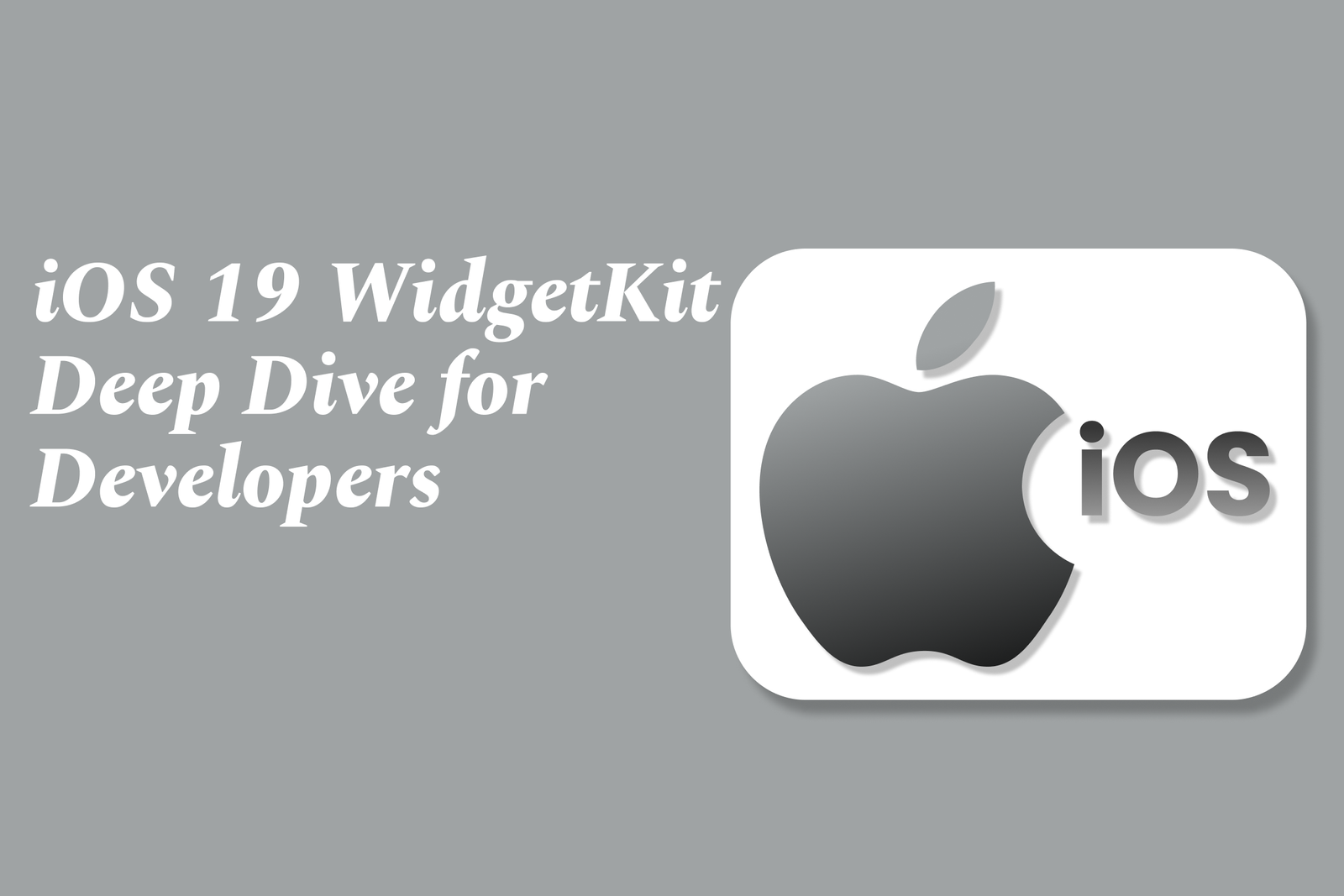iOS 19 widgetkit deep dive for developers
The iOS 19 WidgetKit Deep Dive for Developers is an advanced guide to building dynamic, interactive widgets using SwiftUI and WidgetKit. It covers creating static and live widgets, integrating with Dynamic Island, managing data, and enhancing user engagement on iPhone’s home and lock screens.
iOS 19 WidgetKit Deep Dive for Developers
1 ) Introduction to WidgetKit and SwiftUI 4 for iOS 16
WidgetKit enables developers to build dynamic, interactive widgets for iPhone’s home and lock screens.
The course covers fundamental WidgetKit architecture, including timeline providers, widget views, and configuration.
Focus on leveraging SwiftUI 4 and iOS 16 capabilities to enhance widget functionality.
2 ) WidgetKit Components and Architecture
Understanding the anatomy of widgets: timeline providers manage widget updates; widget views define user interface; configurations customize widget behavior.
Practical widget examples range from static photo widgets to complex live activity widgets.
Integration with system features like the Dynamic Island is explored to create interactive experiences.
3 ) Building Static and Dynamic Widgets
Detailed guidance on adding WidgetKit extensions in Xcode and establishing widget basics.
Techniques to create static widgets displaying fixed content and dynamic widgets fetching live or network driven data.
Emphasis on handling real time content such as weather updates and workout stats.
4 ) Advanced Widget Features: Live Activities and Interactivity
Implementation of live activity widgets that update continuously and respond to user context.
Utilizing App Intents framework for deeper system wide widget integration, enabling interactions via Siri, Spotlight, and controls.
Instructions on configuring widgets for lock screen and Dynamic Island to ensure seamless user engagement.
5 ) Data Management and Synchronization
Strategies for syncing widget data efficiently, including integration with Core Data for persistent storage.
Approaches to manage network calls and API integration ensuring up to date widget content.
Best practices to maintain responsiveness and reduce UI flash during updates.
6 ) Developer Skills and Tools Covered
The course strengthens skills in Swift programming, data modeling, UI design, and API usage within the iOS ecosystem.
Emphasis on building accessible, responsive, and visually compelling widgets that enhance app customization.
Recommended for intermediate iOS developers familiar with Swift and SwiftUI seeking advanced widget creation expertise.
7 ) Course Structure and Delivery
Comprised of 20 modules with approximately 10 hours of content per week over two weeks.
Incorporates video lessons, readings, hands on assignments, and interactive learning techniques.
Practical focus with progressive complexity, starting from widget basics to advanced live activities and Dynamic Island support.
Summary:
This comprehensive deep dive into iOS 19 WidgetKit empowers developers to master widget creation using SwiftUI 4 and iOS 16 features. It covers foundational concepts to advanced practices like live activities and Dynamic Island integration, offering practical skills to deliver engaging and interactive widget experiences on iPhone’s home and lock screens.
https://justacademy.in/news-detail/react-native-app-size-reduction-strategies
https://justacademy.in/news-detail/swift-package-manager:-new-features-for-modular-apps
https://justacademy.in/news-detail/android-offline-mode-improvements
https://justacademy.in/news-detail/flutter-forward-2025-recap
https://justacademy.in/news-detail/ios-development-tools-you-should-be-using
Related Posts
Java supports GDPR and data privacy by enabling secure data handling through encryption, controlled access, and precise data management. It allows developers to minimize PII exposure, ensure data confidentiality, and design workflows that comply with data protection regulations effectively.
Java code quality tools have evolved to include advanced static analysis, integrated security checks, and AI-powered code reviews. These updates help developers detect bugs, enforce coding standards, and enhance security, streamlining the development process and improving overall code reliability.
Java remains a cornerstone in big tech companies, evolving with modern features like records, pattern matching, and virtual threads. Its robust ecosystem, enhanced performance, and growing AI integrations keep it vital for both legacy systems and innovative new projects.
Java and CI/CD pipeline optimizations streamline Java application development by automating builds, tests, and deployments. They improve efficiency through parallelization, caching, and secure secrets management, enabling faster feedback loops and more reliable, scalable software delivery.
Java supports modern cryptography standards through its flexible Java Cryptography Architecture (JCA), enabling integration of advanced algorithms like AES, EdDSA, and post-quantum tools. Libraries like Bouncy Castle offer FIPS-certified, hardware-accelerated implementations for secure development.
Java 23 enhances record patterns by enabling concise, direct destructuring of record components within pattern matching, simplifying type checks and data extraction. This improvement boosts code readability and expressiveness by reducing boilerplate in handling immutable data classes.
Java remains a top choice for mobile app backends, powering scalable, secure, and high-performance server-side solutions. Latest trends include cloud-native microservices, reactive programming, and enhanced JVM optimizations, enabling efficient, flexible, and robust mobile backend development.
Java SE 24 and LTS Java SE 21 offer enhanced features and performance, while Apache Spark 4.0.0 introduces Scala 2.13 support and advanced ML and SQL capabilities. Together, they empower developers to build scalable, high-performance data applications with modern tools.
JUnit 5 modernizes Java testing with a modular architecture, improved assertions, and seamless Java 8+ support. Beyond JUnit, tools like Mockito and AssertJ enhance mocking and assertions, creating a powerful, flexible ecosystem for writing clean, efficient Java unit tests.
Java plays a pivotal role in cloud automation tools by providing a robust, platform-independent language used to build scalable automation frameworks like Jenkins and Selenium, enabling efficient CI/CD pipelines, testing, and orchestration across diverse cloud environments.










